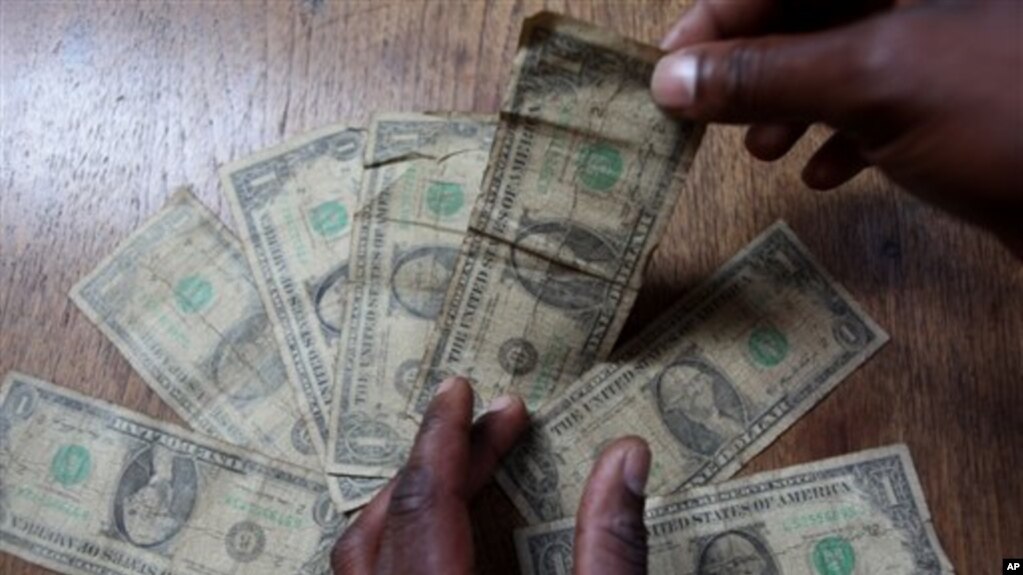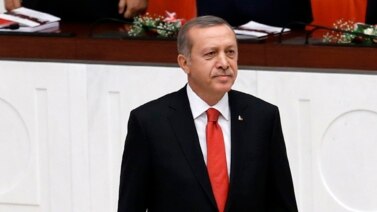
Hello, and welcome once again to “As It Is,” our daily show for people learning everyday American English.
I’m Christopher Cruise in Washington.
Today on the program, we report on demands by some that countries end tax policies that permit companies to move their profits to countries with lower taxes.
“I think a lot of people both here in the UK and around the world are fed up with tax dodging. They’re fed up with a system where the rich and powerful play by a different set of rules to everybody else.”
Then, we go back to 1948, and one of the first confrontations of the Cold War, between the United States and the Soviet Union.
Thais Protest Political Corruption
But first, we look at economic and political corruption in Thailand.
Many Thais joined protests in Bangkok last year. They urged Prime Minister Yingluck Shinawatra to deal with growing corruption in the country.
Mario Ritter reports a businessman noted the rising cost of doing business, including giving bribes to Thai officials.
How much economic activity is lost to corruption can be difficult to estimate. The University of the Thai Chamber of Commerce studied the issue. The university found that over two percent of national production -- or about 11 billion dollars -- will likely be lost to corruption this year. It found that many business people who were questioned said they are paying more to Thai officials and politicians to win government contracts.
Political economist Pasuk Pongpaichit says there is evidence officials are making progress in controlling lower level corruption. But, she says, the slowing world economy means growing competition for profitable deals with the government.
“The globalization, the international pressure for Thailand to become more transparent, is being felt and various government departments are responding to it. It doesn’t mean that things are going to happen very quickly.”
Bandid Nijathaworn is a former central bank official and president of the Thai Institute of Directors. He says corruption in Thailand appears to be more of a problem now than 10 years ago.
“Corruption is a global problem. And now you see corruption appearing as headlines in many countries. So it has become a global issue both in national organization and individual country’s governments trying to tackle it.”
Observers say the fight against corruption needs to go beyond law enforcement, and include non-government and private industry groups.
(MUSIC)
Protesting "Tax Havens"
Earlier this year, demonstrators protested outside the British Treasury to call on the world’s richest countries to end so-called tax havens. These tax haven policies allow companies to move their profits to countries with lower taxes. An investigation found that this practice costs Africa alone $38 billion a year in lost taxes. Former United Nations Secretary-General Kofi Annan led the investigation.
Once again, Mario Ritter.
The demonstrators at the Treasury called on Chancellor George Osborne to discuss the practice with finance ministers from other wealthy countries.
Melanie Ward is a spokeswoman for the “Enough For Everyone If” campaign.
“I think a lot of people both here in the UK and around the world are fed up with tax dodging. They’re fed up with a system where the rich and powerful play by a different set of rules to everybody else.”
Ronen Palan is a professor at City University London. Professor Palan says tax havens and low-tax countries like Ireland are popular because companies and wealthy individuals can save money.
“These countries offer very low taxation, either to [corporations] or to individuals. And, specifically, they target non-residents.”
But critics of tax havens say big companies transfer profits out of the very countries on which they and their wealth depend.
“Africa exported about $1 trillion of capital in the last 30 years, whereas inward investment in terms of FDI [foreign direct investment] or aid is about $300 billion. So Africa is losing capital. Africa, or sub-Saharan Africa, is actually funding development elsewhere.”
The charity ActionAid says the brewing company SABMiller uses a complex system of tax havens. It says this system moves profits out of the company’s operations in developing countries like Ghana.
SABMiller denies any tax abuses. It says in 2010 it paid about $250 million in corporate taxes in India and sub-Saharan Africa.
ActionAid also accuses Associated British Foods of using its subsidiary companies to reduce its taxes in Zambia by millions of dollars. Associated British Foods says the accusations are “incomplete at best and factually wrong in places.”
Mark Littlewood is director-general of the Institute for Economic Affairs in London. He argues that tax havens help the global economy by increasing investment.
“This idea that sort of Western companies that are tax efficient are exploiting these places rather than bringing inward investment to them, I think, is a rather neo-imperialist old-style way of looking at the world. We want more of that inward investment -- that creates jobs and creates growth in some of the poorest countries in the world.”
The Berlin Blockade
Finally, 65 years ago this week, Soviet occupation forces in East Germany established a land and water blockade around West Berlin. Only air traffic was permitted.
The Berlin blockade was seen as the final step by the Soviet Union in an effort to force the United States, France and England to make economic concessions concerning East Berlin. Instead, on June 26, the United States Air Force began to fly supplies into West Berlin's Tempelhof airfield.
Using cargo aircraft as an aerial bridge, the United States flew eighty tons of food, medical supplies and coal to the isolated city every day. In mid-July, larger cargo aircraft began flying in 1,500 tons of supplies on a daily basis.
Altogether, American, French and British aircraft -- flying in all kinds of weather -- delivered enough supplies to feed Berliners for the 321 days of the Berlin Blockade.
The Soviet Union, realizing its plan had failed, lifted the Berlin blockade on May 12th, 1949.
And that’s “As It Is” for today. We hope you enjoyed the program, and we hope it helped you learn everyday American English.
Our thanks to VOA Learning English Economics Correspondent Mario Ritter for his reports today.
I’m Christopher Cruise, and that’s “As It Is” on The Voice of America.





